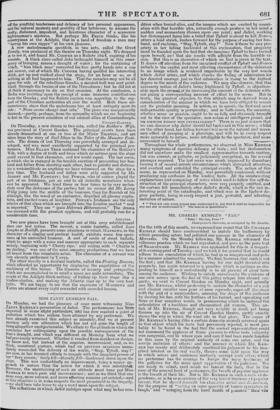MISS FANNY KEMBLE'S FALL.
ON Monday, we had the pleasure of once more witnessing Miss , . sixlCamaae's personation of Juliet. The performance has `Item improved- in Some'slight partieularr,'Ifid has now reached a point of perfection which has seldom been attained by any performer. We have already examined this subject so minutely, that we at present mention only one alteration which has not yet gone the length of being altogether unobjectionable. We allude to the attitude in which she concludes her soliloquizing upon the possible consequences of the friar's draught, and which was different on Monday from what we had previously witnessed. Whether it resulted from accident or design, we know not, but instead of the angular, inconvenient, and, as we think, unnatural posture, which had on previous occasions imme- diately succeeded the delivery of the words, " Stay, Tybalt, stay !" she now, in her frenzied efforts to grapple with the imagined person of her" fiery cousin," fairly fell—literally fall—backward down upon the stage. This was undoubtedly an improvement, being a nearer ap- proach to nature than the action for which it was substituted. However, the maintaining of such an attitude must have put Miss KEMBLE to much pain and inconvenience ; and as we think that one more easy, more natural, and more affecting remains yet untried,—and as this situation is in some respects the most prominent in the tragedy, —we shall here take leave to say a word more upon the subject. The reflections in which Juliet indulges upon what may be her con- dition when buried alive, and the images which are excited by associ- ation with that horrible idea, naturally enough produce in her mind a sudden and momentary illusion upon one point; and Juliet, working her distempered fancy into a belief that Tybalt is about to kill Romeo, utters a loud shriek, rushes forward for the purpose of saving her hus- band, and exclaims, "Stay, Tybalt, stay !" Now if there he any pro- priety in her falling backward at this exclamation, that propriety must be founded upon the fact that she imagines Tybalt to have turned upon herself, and that she recoils with affright from the horrible vi- sion. But this is an aberration of which no hint is given in the text. It draws off attention from the imagined conflict of Tybalt and Romeo (which is the capital and most affecting circumstance of the delusion) to an image which is rendered improbable by the very last words which Juliet utters, and which checks the feeling of admiration for her devoted courage just as that admiration is `rising to the highest degree in the minds of the audience. We may also observe, that this accessory notion of Juliet's being frightened by Tybalt, is objection- able upon the grounsleof its increasing the amount of the delusion with- out giving a corresponding increase of effect to the scene. But in truth, the greatest objection to this attitude may be derived from a consideration of the manner in which we have been obliged to search out its probable meaning. In action, as in speech, the first and most indispensable quality is perspicuity; and in both cases, the meaning, whether sense or passion, ought to be so fully and obviously brought out to the view of the spectator, non soh= ut iutellibere possit, seri NE OMNINO POSSIT NON INTELLICERE.* There is no just reason that we can discover why Juliet should fall backward in this scene ; whilst on the other hand, her falling forward will seem the natural and neces- sary effect of grasping at a phantom, and will be in every respect more agreeable to nature, more intelligible to the spectator, and more convenient to herself.
Throughout the whole performance, we observed in Miss KEMBLE many symptoms of ripening delicacy of taste ; and her declamation did not anywhere make the smallest approximation towards ranting,, but was correct, or pathetic, or judiciously energetical, as the several passages required. The last scene was much improved by disembari rassing it of several minute circumstances which distracted attention;i and overlaid and enfeebled the principal events. The action of this? scene, scene, as represented on Monday, was powerfully condensed, without' producing any confusion in the leading facts. All the uninteresting explanations and comparing of notes which used to follow the self-de- struction of the principal characters, were very properly . omitted, and the curtain fell immediately. after Juliet's death, which is the last in- teresting
point of the catastrophe, and which was in the highest de- gree pathetic, being in every respect a just, powerful, and affecting
imitation of nature. 4 * " That not only every person may understand it, but that it shall be impossible for
any one not to understand it." The maxim is Quintilian's.


















 Previous page
Previous page